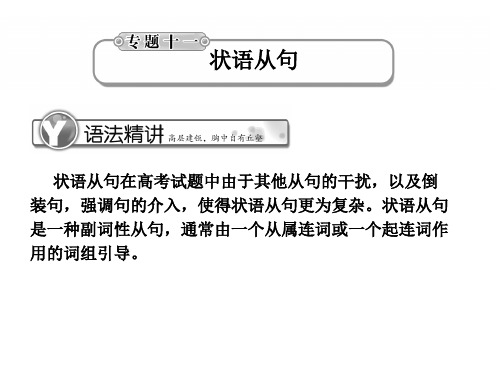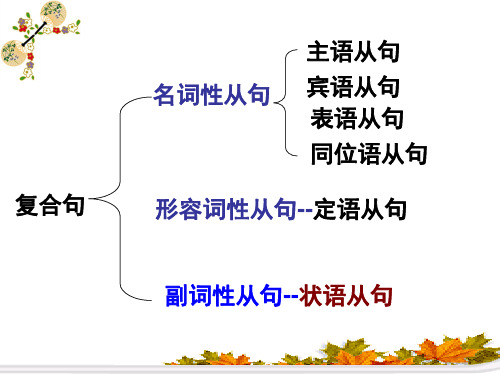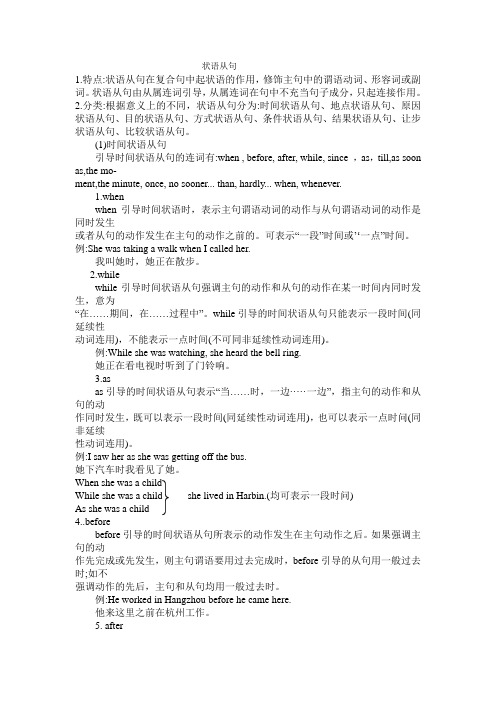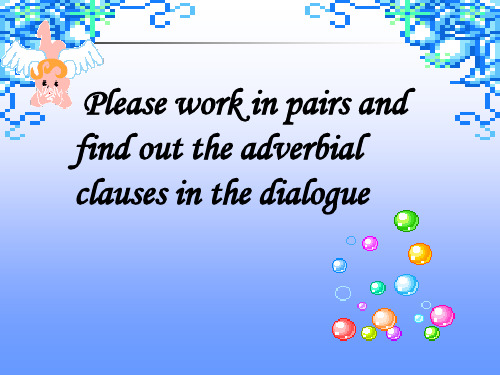状语从句self
高考英语总复习:状语从句

状语从句在高考试题中由于其他从句的干扰,以及倒 装句,强调句的介入,使得状语从句更为复杂。状语从句 是一种副词性从句,通常由一个从属连词或一个起连词作 用的词组引导。
1. 时间状语从句 常见的连词(组):
when, while, as, before, after, once, till, until, as soon as, n, scarcely ...when, no sooner ...than等。
It wasn t long before he told me about the news. 没多久他就告诉了我那条新闻。 ② 不等……就……; 在……之前就…… The telephone rang off before I could answer it. 我还没来得及接电话,电话就挂断了。 ③ 刚……就…… He hardly entered the room before he heard the telephone ring. 他刚进屋电话铃就响了。 ④ 先……再…… You can have a few days to think about it before you make your decision. 做决定之前你还有几天时间考虑。
注意点如下: (1) when, while, as引导的时间状语从句 as表示“当……的时候”,往往和when/ while通用,但它着重强调主句与从句 的动作或事情同时或几乎同时发生。when(at or during the time)既可以表示在某 一点的时候,又可以表示在某一段时间内,主句与从句的动作或事情可以同时发生 也可以先后发生。while强调一段时间,仅表示从句和主句的动作同时发生,并且有 延续意义,该从句中的动词一般要用延续性动词,从句中常用过去进行时态或一般 过去时态;当when表示a period of time时,两者可以互换。 She came up as I was cooking.(同时) 在我做饭时,她走了过来。 When we were at school, we went to the library every day.(在一段时间内) 当我们在学校时,每天都去图书馆。
状语从句(完整版)

as, while, when的区别 的区别
• as表示“当……的时候”,往往和 表示“ 的时候” 往往和when/ while通用,但它 通用, 表示 的时候 通用 着重强调主句与从句的动作或事情同时或几乎同时发生。 着重强调主句与从句的动作或事情同时或几乎同时发生。 • When (at or during the time)既可以表示在某一点的时候, 既可以表示在某一点的时候, 既可以表示在某一点的时候 又可以表示在某一段时间内 某一段时间内, 又可以表示在某一段时间内,主句与从句的动作或事情可 以同时发生也可以先后发生。从句既可以用延续性动词 延续性动词, 以同时发生也可以先后发生。从句既可以用延续性动词, 也可以用短暂性动词 也可以用短暂性动词 • while强调一段时间,仅表示从句和主句的动作同时发生, 强调一段时间,仅表示从句和主句的动作同时发生, 强调一段时间 并且有延续意义,该从句中的动词一般要用延续性动词 延续性动词, 并且有延续意义,该从句中的动词一般要用延续性动词, 从句中常用过去进行时态或一般过去时态; 从句中常用过去进行时态或一般过去时态; 过去进行时态或一般过去时态 • 当when表示 period of time时,两者可以互换。 表示a 表示 时 两者可以互换。
名词性从句
主语从句 宾语从句 表语从句 同位语从句
复合句
形容词性从句--定语从句 形容词性从句 定语从句
副词性从句--状语从句 副词性从句 状语从句
状语时用来修饰 动 词, 形容 词, 副 词或 句子 的一种句子成分。它可以表示时间、地点、 的一种句子成分。它可以表示时间、地点、 原因、目的、结果、条件、让步、比较、方式等。 原因、目的、结果、条件、让步、比较、方式等。 当充当状语的部分是一个句子时, 当充当状语的部分是一个句子时,也就是状语从
高考英语专项复习:状语从句

状语从句状语从句在高考试题中由于其他从句的干扰,以及倒装句,强调句的介入,使得状语从句更为复杂状语从句是一种副词性从句,通常由一个从属连词或一个起连词作用的词组引导状语从句1 时间状语从句常见的连词(组):when, while, as, befre, after, nce, till, until, as sn as, nw that, hardly when, scarcely when, n sner than等可以引导时间状语从句的副(介)词(短语)或名词短语:directly, instantly, iediately, by the tie, the ent, the secnd, the inute, the instant, every tie, each tie, net tie, the last tie等注意点如下:(1) when, while, as引导的时间状语从句as表示“当……的时候”,往往和when/ while通用,但它着重强调主句与从句的动作或事情同时或几乎同时发生when(at r during the tie)既可以表示在某一点的时候,又可以表示在某一段时间内,主句与从句的动作或事情可以同时发生也可以先后发生while强调一段时间,仅表示从句和主句的动作同时发生,并且有延续意义,该从句中的动词一般要用延续性动词,从句中常用过去进行时态或一般过去时态;当when表示a perid f tie时,两者可以互换She cae up as I was cing(同时)在我做饭时,她走了过When we were at schl, we went t the library every day(在一段时间内)当我们在学校时,每天都去图书馆While they were watching TV, I was preparing yself fr the cing eainatin他们在看电视,而我在为即将到的考试做准备Strie while the irn is ht 趁热打铁( 不可用as或when,这里的while意思是“趁……”)一、when可以和延续性动词连用,也可以和短暂性动词连用;而while和as只能和延续性动词连用① Why d yu want a new jb when yu've gt such a gd ne already?(get为短暂性动词)你已经找到如此好的工作,为何还想再找新的?②Srry,I was ut when yu called e.(call为短暂性动词)对不起,你打电话时我刚好外出了③Strie while the irn is ht.(is为延续性动词,表示一种持续的状态)趁热打铁④ The students t ntes as they listened.(listen为延续性动词)学生们边听课边做笔记二、when从句的谓语动词可以在主句谓语动作之前、之后或同时发生;while和as从句的谓语动作必须是和主句谓语动作同时发生1.从句动作在主句动作前发生,只用 when①When he had finished his hewr,he t a shrt rest.(finished先发生)当他完成作业后,他休息了一会儿②When I gt t the airprt,the guests had left.(gt t后发生)当我赶到飞机场时,客人们已经离开了2.从句动作和主句动作同时发生,且从句动作为延续性动词时,when,while,as都可使用①When /While /As we were dancing,a stranger cae in.(dance为延续性动词)当我们跳舞时,一位陌生人走了进②When /While /As she was aing a phnecall,I was writing a letter.(ae为延续性动词)当她在打电话时,我正在写信3.当主句、从句动作同时进行,从句动作的时间概念淡化,而主要表示主句动作发生的背景或条件时,只能用 as这时,as常表示“随着……”;“一边……,一边……”之意① As the tie went n,the weather gt wrse.(as表示“随着……”之意)② The atsphere gets thinner and thinner as the height increases.随着高度的增加,大气越越稀薄③As years g by,hina is getting strnger and richer.随着时间一年一年过去,中国变得越越富强了④The little girls sang as they went.小姑娘们一边走,一边唱⑤The sad ther sat n the radside,shuting as she was crying.伤心的妈妈坐在路边,边哭边叫4.在将时从句中,常用when,且从句须用一般时代替将时①Yu shall brrw the b when I have finished reading it.在我读完这本书后,你可以借阅②When the anager ces here fr a visit net wee,I'll tal with hi abut this.下周,经理这参观时,我会和他谈谈此事三、when用于表示“一……就……”的句型中(指过去的事情)sb.had hardly(=scarcely) dne sth.when...=Hardly / Scarcely had sb.dne sth.when...①I had hardly /scarcely clsed y eyes when sene nced at the dr.=Hardly / Scarcely had I clsed y eyes when sene nced at the dr.我刚一闭上眼,就有人在敲门了②I had hardly /scarcely entered y r when the telephne rang.=Hardly /Scarcely had I entered y r when the telephne rang.我刚一走进房门,电话就响了(2) befre引导状语从句时的常见重点句型①It will (nt) be befre还要……才,要不了多久就……It was (nt) befre 过了……才(没多久就……)It was a lng tie befre I gt t sleep过了好长时间我才睡着了It wasn t lng befre he tld e abut the news没多久他就告诉了我那条新闻②不等……就……;在……之前就……The telephne rang ff befre I culd answer it我还没得及接电话,电话就挂断了③刚……就……He hardly entered the r befre he heard the telephne ring他刚进屋电话铃就响了④先……再……Yu can have a few days t thin abut it befre yu ae yur decisin做决定之前你还有几天时间考虑(3)since 引导的从句用延续性动词的过去式(包括过去完成时)时,则从句的动作已经结束,从句意思是否定的如果从句的动词是延续性动词的现在完成时态,则从句意思是肯定的He has never been t see e since I was ill我病愈后,他一直未看我(不再生病了)He has never been t see e since I have been ill我病了,他一直未看我I haven t heard fr hi since he lived here自他从这里搬走,我就没有收到他的信(不住在这儿了)(4) till, until如果till与until用在肯定句中时,则主句中谓语动词部分所表示的动作或状态一直延续到某时或某个动作发生时才结束注意它的倒装句和强调句I didn t recgnize she was y classate until she t ff her dar glasses=Nt until she t ff her dar glasses did I recgnise she was y classate=It was nt until she t ff her dar glasses that I recgnised she was y classate直到她摘下墨镜,我才认出她是我的同学2 原因状语从句引导原因状语从句的常见连词或短语:as, because, since, nw that, cnsidering that, seeing that(鉴于……)注意以下几点:(1) because, since, as, fr, nw thatbecause语气最强,用于回答why的提问,可与强调词nly, just 以及否定词nt 连用但不可以与s连用since 引导的从句语气次于because引导的从句,常表示稍加分析后而推断出的原因,或指人们已知的事实,比as正式一些,常置于句首as 语气最弱,其原因只是对结果的附带说明,一般放在句首fr虽然解释为“因为”但只是一个并列连词,它也常引导句子表示原因,但不是原因状语从句,它是一个并列句fr所提供的理由是一种补充性的说明,表示推测的理由nw that意为“既然,由于”表示由于人们已知的事实或正在发生的事而产生某个结果He failed because he was careless他因粗心而失败了Since everyne has ce, let s begin ur eeting既然大家都了,我们开会吧As all the seats were full, he std there所有的座位都满了,他只好站那儿It ight have rained last night fr the grund is wet昨晚可能下雨了,因为地面是湿的Nw that the ids have left he we have a lt f etra space由于孩子们离开了家,所以我们有了额外的空间3 地点状语从句地点状语从句常由下列连词引导:where, wherever等Yu ay find hi where his brther lives你可能会在他哥哥居住的地方找到他Yu are free t g wherever yu lie你可以去你想要去的任何地方Anywhere he went, he gt war welce无论他走到哪儿,都受到热烈欢迎The girl taes the dll with her everywhere she ges这个女孩无论去哪都带着她的布娃娃Where there is a will, there is a way 有志者事竟成4 结果状语从句结果状语从句常由下列连词引导:s that,such that,s that等要注意以下几个问题(1) 五种结构:①s+adj/adv+that②such (a/an+adj)+n+that③s+adj+a/an+n+that=such a/an+adj+n+that④s any/uch/few/little(少)+n+that⑤such+(adj) +n (u/pl)+ thatHe spe s fast that I culdn t fllw hi他说的如此的快,我跟不上他It was such a lvely day / s lvely a day that we all went swiing今天天气如此的好,我们大家都去游泳了(2) s或such置于句首时,主句常用倒装It was such a lvely day / s lvely a day that we all went swiing=Such a lvely day was it that we all went swiing今天天气如此的好,我们大家都去游泳了(3)注意以上结构与定语从句s/such as的区别This is such an interesting/s interesting a fil that everyne wants t see it这是一部很有趣的电影以至于每个人都想去看5 目的状语从句目的状语从句由下列连词引导:s that, in rder that, fr fear that, in case等(注:s that也可用引导结果状语从句)s that, in rder that引导的目的状语从句中常需用情态动词s that引导的目的状语从句只能放在主句之后in rder that 引导的目的状语从句可以放在主句之前或之后We set ut early s that we culd see the sunrise我们很早出发以便能看到日出He sent the letter by air ail s that it ight reach the in tie他空邮这封信以便他们能及时收到6 条件状语从句条件状语从句分为真实条件句和非真实条件句(用在虚拟语气中)注意:在真实条件句中,常用一般时态代替将时常由下列连词引导条件状语从句:if, unless, suppse, suppsing, prviding (that), prvided (that), given (that), in case, n cnditin that, as lng as, s lng as, s far as等(1) unless=if ntYu will fail unless yu study hard除非你努力,否则你就要失败(2) suppse, suppsing, prviding(that), prvided(that), given(that)= ifGiven that he supprts us, we ll win the electin如果他支持我们,我们就会赢得选举(3)n cnditin that, as lng as, s lng as = nly ifAs lng as yu dn t lse heart, yu will succeed只要你不灰心,你就会成功(4) as(s) far asS far as I a cncerned, I in favur f “ercy illing”就我个人而言,我支持安乐死7 让步状语从句引导让步状语从句的连词:althugh, thugh, as, even if, even thugh,while, whether r, whever, whatever, hwever, n atter+疑问词等注意以下几点:(1) althugh, thugh引导让步状语从句时,主句前不能用but,但可以加yet, stillThugh it was raining hard, yet they didn t stp wring尽管下着大雨,他们仍然在工作(2) as引导让步状语从句时,必须用前置结构,通常是从句中的表语、状语或动词原形放在句首,放在句首的名词前的冠词要去掉Thugh he is a child, he nws a lt=hild as(thugh)he is, he nws a lt尽管他是个孩子,但他仍知道的很多(注意在child前不要用冠词)Thugh I lie it very uch, I wn t buy it=Much as I lie it, I wn t buy it尽管我非常喜欢它,但我也不会买它(3)whether r (nt ) 引导的从句,提供两个对比的¡°尽管¡±情况,含有条件意味(Whether yu)Believe it r nt, it is trueWhether yu ce here r we g there, the tpic f discussin will reain unchanged不管是你这儿还是我们去那儿,讨论的主题保持不变(4) 疑问词+ever=n atter +疑问词Whever yu are, yu ust shw yur pass无论你是谁,你都必须出示你的通行证Whenever yu ce, yu are welce8 方式状语从句引导方式状语从句的连词或短语:as, as if, as thugh,the way等注意以下几点:(1) as引导方式状语从句时意为¡°按照¡±,¡°如同¡±,前面常用加强语气I did it just as yu tld e = I did it just as tld t我是按照你的吩咐做的He didn t win the atch as epected(2) as if和as thugh 引导的从句中,谓语常用虚拟语气,有时也用陈述语气It sees as if it were ging t rain(3)连词while 和whereas 可以表示对比Whereas he is rather lazy, she is quite energetic注意状语从句中的省略现象(1) 连接词+过去分词Unless repaired, the washing achine is n use(2) 连词+现在分词L ut while crssing the street(3)连词+形容词/其他常见的有if necessary,if pssible,when necessary,if any等(4) 比较状语从句中的省略He arrived he half an hur earlier than (he had been) epected例1My parents dn’t ind what jb I d I a happy(2009•陕西)A even thughB as sn as as lng as D as thugh解析:选考查状语从句根据题干意思可知,此处是条件状语从句as lng as只要;even thugh引导让步状语从句,意为“即使”;as sn as引导时间状语从句,意为“一……就……”;as thugh引导方式状语从句,意为“仿佛,好象”例2—Shall we have ur picnic trrw?—it desn’t rain (2009•山东)A UntilB While Once D If解析:选D考查交际用语答句句意为:如果明天不下雨的话例3She had just finished her hewr her ther ased her t practise playing the pian yesterday(2009•福建)A whenB while after D since解析:选A考查状语从句由句意可知,此处when用作并列连词,意为“这时”例4Yu d better nt leave the edicine ids can get at it(2008•山东)Aeven if Bwhich where Ds that解析:选句意为:你最好不要把药放在小孩子够得着的地方where引导地点状语从句even if 即使;which 不引导状语从句;s that 为了;以至于;引导目的或结果状语从句例5There were se chairs left ver everyne had sat dwn(2008•四川)A whenB until that D where解析:选A句意为:大家都坐下之后,还有一些椅子空着when 当……时候,引导时间状语从句,符合题意until 直到,引导时间状语从句,但与题意不符;that不引导状语从句;where引导地点状语从句例6Occasins are quite rare I have the tie t spend a day with y ids(2008•山东)Awh Bwhich why Dwhen解析:选D句意为:我很少有机会和孩子在一起待上一天的时间when在此处引导定语从句,修饰先行词ccasins(机会),并在从句中作时间状语wh和which是关系代词,定语从句中不缺少主语、宾语、表语,故排除;why引导定语从句时表示原因,与题意不符例7Trrw is T’s birthdayHave yu gt any idea the party is t be held?(2008•陕西)A what Bwhich that Dwhere解析:选D句意为:明天就是汤姆的生日了,你知道生日聚会在什么地方进行吗?idea后的部分是同位语从句,说明idea的内容;根据题意判断用where引导例8The last tie we had great fun was we were visiting the Wat er Par(2008•天津)A Where Bhw when Dwhy解析:选句意为:我们最后一次玩得很痛快是在游览水上公园时was后的部分是一个表语从句,从句中缺少状语,根据题意判断用when引导例9Dn’t prise anything yu are ne hundred percent sure(2008•浙江)A whetherB after hw D unless解析:选D句意为:不要承诺什么,除非你有百分之百的把握unless 如果不,除非;符合题意whether 是否;after ……之后;hw 如何例10 well prepared yu are, yu still need a lt f luc in untain clibing(2008·上海)A HweverB Whatever N atter D Althugh解析:选A考查hwever 的用法hwever相当于n atter hw, 但n atter不能单独使用;句中的well是副词,所以用hwever而不用whatever修饰;althugh引导的让步状语从句不倒装1 I’ll let yu nw ____ he ces bacA befreB because as sn as D althugh2 She will sing a sng ____ she is asedA ifB unless fr D since3 We will wr ____ we are neededA wheneverB because since D wherever4 Read it alud _____ the class can hear yuA s thatB if when D althugh5_____ yu g, dn't frget yur pepleA WheneverB Hwever Wherever D Whichever6 It is abut ten years _____ I et yu lastA sinceB fr when D as7 They will never succeed, _____ hard they tryA becauseB hwever when D since8 _____ still half drun, he ade his way heA WhenB Because Thugh D As9 _____ she was very tired, she went n wringA AsB Althugh Even D In spite f10 Busy _____ he was, he tried his best t help yuA asB when since D fr11 I learned a little Russian _____ I was at iddle schlA thughB althugh as if D when12 _____ we gt t the statin, the train had left alreadyA IfB Unless Since D When13 _____ the rain stps, we' 11 set ff fr the statinA BefreB Unless As sn as D Thugh14 She was _____ tired _____ she culd nt ve an inchA s, thatB such, that very, that D s, as15 We didn’t g he _____ we finished the wrA sinceB until because D thugh16 I'll stay here _____ everyne else ces bacA even ifB as thugh because D until17 Althugh it's raining, _____ are still wring in the fieldA theyB but they and they D s they18 Spea t hi slwly _____ he ay understand yu betterA sinceB s that fr D because19 Yu'll iss the train ______ yu hurry upA unlessB as if D until20 When yu read the b, yu' d better ae a ar _____ yu have any questinsA at whichB at where the place D where21 We'd better hurry ______ it is getting darA andB but as D unless22 I didn' t anage t d it _____ yu had eplained hwA untilB unless when D befre23_____ he ces, we wn't be able t gA WithutB Unless Ecept D Even24 I hurried _____ I wuldn't be late fr classA sinceB s that as if D unless25 _____ I catch a cld, I have pain in y bacA Every tieB Thugh Even D Where26 What's the atter _____ they still haven't answered the telegra?A whenB that thugh D hwever27 Bring it nearer _____ I ay see it betterA althughB even thugh s that D since28 Yu ay arrive in Beijing early _____ yu ind taing the night trainA thatB thugh unless D if29 Helen listened carefully _____ she ight discver eactly what she neededA in thatB in rder that in case D even thugh30 Mre peple will eat ut in restaurants _____ they d tdayA thanB when while D as31_____ hard she tries, she can hardly avid aing istaes in her hewrA MuchB Hwever As D Althugh32 Pr _____ it ay be, there is n place lie he, _____ yu ay gA as; whereverB thugh; whenever in spite f; when D that; wherever33 The child was __ iediately after supperA enugh tired t g t bedB t tired t g t beds tired that he went t bed D very tired, he went t bed34 The histry f nursing __ the histry f anA as ld asB is ld than that is as ld as D is as ld as35 _____ brn in hicag, the authr was faus fr his stries abut New YrA SinceB Once WhenD Althugh36_____ we std at the tp f the building, the peple belw were hardly visibleA AsB Althugh Unless D In spite f37 Scarcely was Gerge Washingtn in his teens _____ his father diedA thanB as while D when38 _____ David ges, he is welceA WhicheverB Hwever Wherever D Whatever39 The huse std _____ there had been a rcA whichB at which when D where40 Sall _____ it is, the pen is a st useful tlA becauseB s if D as41 After the new technique was intrduced, the factry prduced _____ tractrs in 1988 as the year befreA as twice anyB as any twice twice as any D twice any as42 The pian in the ther shp will be _____, but _____A cheaper; nt as betterB re cheap; nt as bettercheaper; nt as gd D re cheap; nt as gd43 Jhn plays ftball _____, if nt better than, DavidA as wellB as well as s well D s well as44 Althugh he is cnsidered a great writer,A his wrs are nt widely readB but his wrs are nt widely readhwever his wrs are nt widely read D still his wrs are nt widely read45 ___ the day went n, the weather gt wrseA WithB Since While D As46—What was the party lie?—Wnderful It' s years _____ I enjyed yself s uchA afterB when befre D since47 It was nt _____ she t ff her dar glasses _____ I realized she was a faus fil starA when; thatB until; that until; when D when; then48 If we wr with a strng will, we can verce any difficulty, _____ great it isA whatB hw hwever D whatever49 After the war, a new schl building was put up _____ there had nce been a theatreA thatB where which D when50_____, Mther will wait fr hi t have dinner tgetherA Hwever late is heB Hwever he is lateHwever is he late D Hwever late he is51 He will ce t call n yu the ent he ____ his paintingA will finishB finished has finished D had finished52 ____ difficult the tas ay be, we will try ur best t cplete it in tieA N atterB N wnder Thugh D Hwever53 It was ____ that s he culdn’t finish it by herselfA s difficult a wrB such a difficult wr s difficult wr D such difficult wr1~5 ADA 6~10 ABBA 11~15 DDAB 16~20 DABAD 21~25 ABBA26~30 BBD 31~35 BADD 36~40 ADDD 41~45 BAD 46~50 DBBD51~53 DD。
状语从句的用法讲解[整理版]
![状语从句的用法讲解[整理版]](https://img.taocdn.com/s3/m/1e680b72793e0912a21614791711cc7931b77806.png)
状语从句一、概述状语从句(adverbial clause)在句中作状语,可修饰主句中的动词、形容词和副词等。
状语从句由从属连词引导。
状语从句可放在句首或句末。
放在句首时,从句后面常用逗号;放在句末时,从句前面往往不用逗号。
When the plane arrived, some of the detectives were waiting inside the main building while others were waiting on the airfield.当飞机抵达时,一部分侦探等在主楼里面,而另一部分则等在停机坪上。
When I came home, my wife was cooking dinner. 我回家时,妻子在做晚饭。
Though he was poor, he was happy. 虽然他很穷却很快乐。
If you ask him, he will help you. 如果你向他请求,他会帮助你。
Since you ask, I will tell you. 你既然问,我就告诉你。
I can't tell you when you won't listen. 既然你不想听,我就不告诉你了。
He stopped trying, when he might have succeeded next time. 他不再试了,其实他可能下一次就成功。
二、引导状语从句的连词分类状语从句根据它们的含义分为时间、地点、原因、目的、结果、方式、让步、条1、引导时间状语从句从属常用连词例析常用来引导时间状语从句的从属连词有:when(当……的时候),whenever(每当),after(在……之后),before(在……之前),as(当…… ;一边……一边),as soon as/hardly…when/no sooner…than(一……就……),while(在……期间),till/until(直到),since(自从),once(一旦……就……)。
状语从句

状语从句1.特点:状语从句在复合句中起状语的作用,修饰主句中的谓语动词、形容词或副词。
状语从句由从属连词引导,从属连词在句中不充当句子成分,只起连接作用。
2.分类:根据意义上的不同,状语从句分为:时间状语从句、地点状语从句、原因状语从句、目的状语从句、方式状语从句、条件状语从句、结果状语从句、让步状语从句、比较状语从句。
(1)时间状语从句引导时间状语从句的连词有:when , before, after, while, since ,as,till,as soon as,the mo-ment,the minute, once, no sooner... than, hardly... when, whenever.1.whenwhen引导时间状语时,表示主句谓语动词的动作与从句谓语动词的动作是同时发生或者从句的动作发生在主句的动作之前的。
可表示“一段”时间或‟…一点”时间。
例:She was taking a walk when I called her.我叫她时,她正在散步。
2.whilewhile引导时间状语从句强调主句的动作和从句的动作在某一时间内同时发生,意为“在……期间,在……过程中”。
while引导的时间状语从句只能表示一段时间(同延续性动词连用),不能表示一点时间(不可同非延续性动词连用)。
例:While she was watching, she heard the bell ring.她正在看电视时听到了门铃响。
3.asas引导的时间状语从句表示“当……时,一边·····一边”,指主句的动作和从句的动作同时发生,既可以表示一段时间(同延续性动词连用),也可以表示一点时问(同非延续性动词连用)。
例:I saw her as she was getting off the bus.她下汽车时我看见了她。
When she was a childWhile she was a child she lived in Harbin.(均可表示一段时问)As she was a child4..beforebefore引导的时间状语从句所表示的动作发生在主句动作之后。
我的状语从句(时间、地点)

Dialogue: Husband—H Wife--W
H: You sing terribly as my sister (does). And you like singing more than she does. W: I won’t stop singing unless I sing this song well. H: Then I will go out in order that I don’t disturb you. Before it gets dark ,I’ll come back. W: Stay where you are.
H: Why? W: Because I need a listener, you can’t leave now. H: But I don’t need a singer now. W: I shut the door so heavily that it fell on my head. I have to stop singing now.
patient listener.
定义: 在复合句中由从句表示的状语 称作状语从句,它可以用来修 饰谓语(包括非谓语动词)、 定语或状语,或是整个句子。
状语从句一般分为九大类 状语从句类别: 时间状语从句 原因状语从句 目的状语从句 方式状语从句 让步状语从句 地点状语从句 条件状语从句 结果状语从句 比较状语从句
三 考点与难点归纳 考点 1 when ,while 和 as
When lived there, I used to go to the sea1 _______I -shore on Sundays. (延续性,同时发生) 2 _______ When the film ended, the people went back. (短暂性,先后发生) While I was wondering at this, our school3 _______ -master took his place. (延续性,同时发生) 4 He hurried home, looking behind _____ as he went. (同时发生,一边…一边) 5 John sings _____ as he works. 6 We were having a meeting _____someone when broke in. (just at that time)
高中英语状语从句用法详解文档
高中英语状语从句用法详解文档四维教育状语从句用法详解在主从复合句中修饰主句的动词、形容词、副词等的从句叫状语从句。
一般可分为:时间状语从句、地点状语从句、原因状语从句、目的状语从句、结果状语从句、条件状语从句、让步状语从句、比较状语从句、方式状语从句。
I时间状语从句:起时间状语作用的从句。
(时间状语从句位置灵活,可以在句首,也可在句末)常用来引导时间状语从句的引导词有:when, while, as, after, before,until/till, since, as soon as, immediately, the moment, every time, whenever等。
1.when, while, asI was very happy when I heard from you.收到你的时我非常兴奋。
When you deal with them, you should be cautious.跟他们打交道时,你应当郑重。
when指导时间状语从句中的谓语动词能够用非延续性动词,也可用延续性动词。
When I was young, I went to town myself.当我还年青时,我本人独自去城里。
(延续性动词)When I lived in country, I used to carry some water for him.我住在农村时,常常为他担水。
(延续性动词)When he received the letter, he'll tell us.当他接到后,他会告诉我们的。
(非延续性动词)When the fire broke out, all the students were sleeping soundly.火灾发生时,所有的学生正在熟睡。
(非延续性动词)注意:当when引导的时间状语从句为系表结构,而且其主语和主句的主语一致,其表语又是一个名词时,就能够用由as指导的省略句来代替when指导的从句。
我的状语从句(时间、地点)
准确掌握每一个连词的含义 是掌握状语从句的关键。
同时要注意主从句的时态呼应。
二 基础知识回顾:时间状从的从属连词 归纳时间状语从句连接词: when, while, as, before, after, till, until, not…until, the first/second…/last time, as soon as, the moment, the minute, the instant, immediately, directly, instantly, hardly/scarcely…when, no sooner…than
二 基础知识回顾:时间状从的从属连词 基础练习:用适当的连词填空
9. ________ we came to the university, we Since have learned quite a lot. 10. We were watching TV ______ suddenly when the lights went out. 11. Please don’t talk so loud ______ others while are working. 12. He jumped into the water _______ I before could stop him.
方式状从
H: Why? W: Because I need a listener, you can’t _______________________ leave now. 原因状从 H: But I don’t need a singer now. W: I shut the door ____________________ so heavily that it fell on my head. ____________ I have to stop singing now.
状语从句练习30题
状语从句练习30题1. I was doing my homework ______ my mother was cooking dinner.A. whileB. whenC. asD. until答案:A。
本题考查时间状语从句中“while”“when”“as”的用法区别。
“while”强调两个动作同时进行,“我做作业”和“妈妈做饭”两个动作同时发生,所以用“while”;“when”既可表示动作同时发生,也可表示一个动作在另一个动作发生的过程中发生;“as”通常强调两个动作伴随进行;“until”表示“直到……”,不符合题意。
2. We were having a picnic ______ it suddenly started to rain.A. beforeB. afterC. whenD. while答案:C。
“when”在此表示一个动作正在进行时,另一个动作突然发生,“正在野餐”时“突然开始下雨”;“before”表示“在……之前”;“after”表示“在……之后”;“while”强调两个动作同时进行,此处不合适。
3. ______ I was walking in the park, I saw a beautiful bird.A. WhileB. WhenC. As soon asD. Before答案:A。
“While”表示在某个动作进行的过程中另一个动作发生,“在公园散步时看到鸟”;“When”也有“当……时”的意思,但“While”更强调动作的持续性;“As soon as”表示“一……就……”;“Before”表示“在……之前”。
4. He was reading a book ______ the phone rang.A. whileB. whenC. asD. until答案:B。
“when”表示一个动作正在进行时,另一个动作突然发生,“正在读书时电话响了”;“while”强调两个动作同时进行;“as”强调两个动作伴随进行;“until”表示“直到……”,不符合题意。
英语作文状语从句
英语作文状语从句I woke up late this morning because my alarm clockdidn't go off. I quickly got dressed and grabbed a piece of toast before running out the door to catch the bus. As I was rushing to the bus stop, I realized I had forgotten my umbrella, and it started to rain.When I arrived at school, I realized I had left my homework on the kitchen table. I was so frustrated with myself for being so forgetful. During class, my stomach started growling loudly, and I realized I had forgotten to pack my lunch.After school, I went to the library to study for an upcoming exam. However, I couldn't concentrate because my phone kept buzzing with notifications. I forgot to put it on silent mode before starting my study session.As I was walking home, I saw my friend waiting for me at the corner. I had completely forgotten that we had madeplans to hang out that evening. I felt bad for standing her up, but she was understanding and we rescheduled for another day.Overall, it was a day filled with forgetfulness and distractions. I realized the importance of being more organized and mindful of my responsibilities in the future.。
- 1、下载文档前请自行甄别文档内容的完整性,平台不提供额外的编辑、内容补充、找答案等附加服务。
- 2、"仅部分预览"的文档,不可在线预览部分如存在完整性等问题,可反馈申请退款(可完整预览的文档不适用该条件!)。
- 3、如文档侵犯您的权益,请联系客服反馈,我们会尽快为您处理(人工客服工作时间:9:00-18:30)。
状语从句【知识点拨】在复合句中充当状语,用来修饰谓语动词、形容词和副词的句子称为状语从句,也叫副词性从句。
状语从句可分为九种类型:时间、地点、原因、结果、目的、条件、让步、比较、方式等从句。
主要考查的重点有:引导状语从句的从属性连词的选择;主从的时态,语态;与其他从句和句型的区别;从句中的省略。
一、状语从句的分类1、时间状语从句(1)“当……的时候”when/while/as都表示“当……的时候”另一件事在发生;如:As/When/while I was walking down the street,I happened to see a policeman running after a car.“W hen”还可以表示”突然,这时,既然,如果”之意。
如:I felt disappointed and was about to leave,when something occurred which attracted my attention.(突然)Why should he do me an injury when he has already saved my life?(既然)I’ll come to see you when I am free.(如果)“While”与延续性动词连用,表示在“某一段时间里”或“在……期间”,强调主从句动作同时发生。
如:While we were chatting,she was working hard on her study.“while”还可以表示“而,却”作并列连词,表示对比。
如:He likes pop music,while I am fond of folk music.“As”除表原因外,还表示“一面……一面……”“随着……”之意。
如:Looking behind as he was running,he hurried home.As the day went on,the weather got worse.“一……就……”的表达法常见的连词有as soon as,hardly/scarely……when,no sooner …than,once(一旦……,就……),the memont,the minute,the second,the instance,immdiately,directly,instently,presently等。
如:Hardly had the train left when we got to the station.I knew I had made a mistake directly I handed in my paper.She said she’d phone you the memont he got home.“直到……才……”until/till,before(“不到……,就……”);till不能置于句首,“not do……till/until”中“do”为短暂动词;“not……until”的理解:强调、倒装形式。
如:Until you told me ,I had no idea of it。
He can’t go to bed till/until he has finished the homework.Not until you told me,did I have any idea of it.It was not until you told me that I had any idea of it.“Before”意为“之后……,才……”;“不等……就……”;“趁……”,“宁愿……也不……”。
如:It will be a long time before we meet again。
He had got on the train before I could say goodbye.Please write it down now before you forget it.He will die of hunger before he will steal.(“宁愿……也不……”)“自从……,自……以来”sinceIt is/has been two years since I smoked(“延续性动词要从该动作结束算起,即停止该动作以来”)。
时间名词+从句作状语Every time,each time,next time;last time;any time;the first time;all the time;等,以及the day,the week,the year,the morning等,均可连接从句作状语。
如:Each /Every time I was in touble,he would come and help me out.The morning I saw him,he was wrinting a report for the newspaper.2、地点状语从句连接词有where(“在……的地方”);wherever,anywhere;everywhere等。
如:He will be welcome anywhere he goes.3、原因状语从句常用连词有:because;as;since;now that;seeing that(鉴于);consideringthat(考虑到……)Because是直接原因,常用来回答why,as与now that同义语气比because弱;for为附加原因不用于句首。
如:Why were you absent from class yertesday?__because Iwas illSince/Now that every body is here.Let’s begin our meeting.You’d better not go out,for it’s getting dark.4、目的状语从句常用连词有:so that;in order that;in case;for fear that等。
从句中常用情态动词can could may或might等。
如:The foreigner spoke with signs so that he could make himself understood easily.5、结果状语从句常用连词有:so……that;such……that:so that等。
So+adj/adv+that clause;such+n+that clause;so +不定代词+n+that clause;so adj+a/an+n=such a/an+adj+n.如:This is such a heavy box that I can not lift it.This is so heavy a box that I can not lift it.6、让步状语从句连词有although;though;even though/if;no matter+wh-;wh-+even;as(用于倒装句)等都意为:“尽管,虽然,即使,无论,哪怕是……”。
如:While I object,I’ll say nothing.He is still unsatisfied though he has got everything.No matter what/Whatever you say,I won’t give up.Object as you may,I’ll say nothing.Child as he is,he knows a lot.7、条件状语从句常用的从属连词有:if;unless;as/so long as;in case;on condition that;if only;provided/providing(假如);once;the more……;the more……;but for(介词)等。
如:As /so long as you don’t lose heart,you’ll succeed.What will you do first in case there is a fire?The air will get worse unless the government takes action to stop the pollution.The more you explained,the more I was confused.Supposed/Supposing that refuse us,who else can we turn to for help?8、比较状语从句连词有:than(比较对象要一致);not as/so……as;as ……as等。
如:The population of our town is larger than that of theirs.9、方式状语从句连接词有:as;as if/though;the same……as……等。
如:The teacher asked us to do as he did.I remember the whole thing as if it happened yesterday.He opened his lips ,as if he was to say something.二、状语从句的省略现象当状语从句的主语与主句的主语一致,谓语部分含有be动词或者从句的主谓部分是it is时,常省略此部分。
如:Don’t speak ( until you are) spoke to.Come and stay with me (if it si ) possible.His spoken English is as good,if not better than, as yours.三、状语从句中的时态问题时间状语和条件状语从句中用一般现在时或现在完成时表将来,主句用将来时或情态动词加动词原形。
